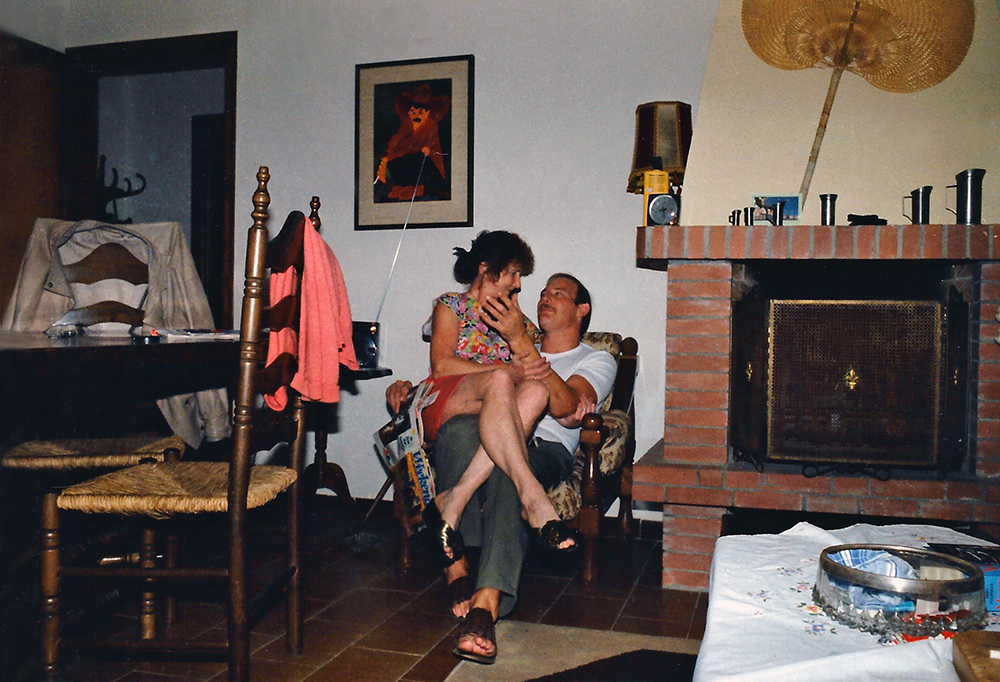Willy Vanluyten, my fifteen-years-younger boyfriend from 1987 to 1991, died suddenly in 1991, at just under 35 years old. Everything around the death was spooky, and the apartment I had lived in with him was more spooky afterwards. Keep This Quiet! III introduces Willy, and the story is carried forward in KTQ! IV. Willy had a short life. He made his livelihood as a truck driver. But he was quite unordinary. Here is how he entered KTQ! III. He was Flemish. This scene takes place in Tienen, Belgium:
Superbly physical, Willy lifted his heavy barbell over his head with one hand in the apartment. Lacking backing, he’d foregone his ambition to be a Formula One driver—or boxer. Now, to get their wings, young men tried to provoke him into fights. He had a kind of masculinity I wasn’t used to.
After his father died in a motorcycle accident, he’d left school, at fourteen. Financially, his mother needed him. When I first walked into his apartment he was at the sink, washing plastic grocery sacks. I asked why. He said to reuse them.
Though no one suspected it, he didn’t know the alphabet (he spelled by ear). He spoke excellent English—learned from pop music and TV-film subtitles. On TV we watched every kind of sport: dart tournaments (he played darts in bars), snooker, soccer, Wimbledon matches, Formula One racing. We attended dirt bike competitions. I loved watching the riders go airborne over mounds. The way I’d loved slalom waterskiing.
Willy often stood before his tape deck, volume full blast—light on his feet, dancing in double time, 8/8, whereas my tempo was 4/4.
Willy was on an extra-fast track. I see him listening to Joe Cocker, which he pronounced “coke-r” (“I just wanna be the one you run to” or “If you want a partner for a ride . . . I’m your man”). Willy was grainy, passionate, muscular, but not knottily unlike a body builder. He played Dire Straits and oldies, “Get Ready” with long sax solo. Saxophonist was another career he’d have preferred. Or swimmer. He’d have been lost in the car without his music.
Often battling a dead battery, he pushed the auto downhill in front of the apartment. With the engine sputtering, we hopped in. Later he had a charger in the kitchen.
He coasted to the last drop of gas—perhaps, miscalculating, hitting empty. He carried a gas can in the trunk and would walk or hitchhike down the road a ways to fill it. Once, while he was tinkering underneath his jacked-up auto it fell on his chest. The next-door neighbor’s eyes bulged as Willy lifted it and continued tinkering. He was occasionally a bouncer at a disco.
Willy seemed to work the world like a room. He connected people. No matter what, if the doorbell rang he answered. He loved nature. And took me on picnics where—with cows in the distance—we lay in the grass to feel the blades. Or wearing a bright orange workout jacket, he drove us to a woods to jog together down a trail.
We’d bicycle forty kilometers, then drink water from a natural spring. I’d not known such things were masculine, but with ultramale Willy they were. He might find a private outdoor nook near a lake to make love in after the bike ride, or in the ocean. He was all in all a breed I was glad to hook up with. We could not marry, because in Catholic Belgium without paying a lot of money for a divorce you had to wait out five years’ separation.
Willy always wore his Cross: it was “the Man,” he said, adding enigmatically—no explanation—that if he ever lost it, our relationship was over. He also said that after one accident (not his fault) he woke from a coma with amnesia. He’d let on to no one; finally his memory returned.
However, the amnesia left him a budding psychic. He demonstrated how he could use a pendulum. I challenged him and he asked it if I had ever had children. The pendulum said yes, and he remained horrified when I explained I held a “yes” in mind, thinking of my manuscripts. So, he thought, I was overriding his will. That didn’t go down well, but I found it amusing. I reveled in how freeing it was to relate like this, where I could express any emotion, in fact was encouraged to. Willy was up for it. The meeting between us was significant, dramatic, downright odd if you put the experience into its beginning and end.
After he died I for the second time dived into “afterlife” questions, in that he seemed to be still around in the apartment. Read more on this in Keep This Quiet! III and IV. It was yet another quirky, jarring, page-turning, consciousness-creating transformative initiation.
